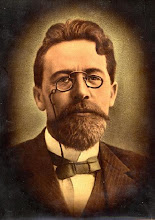Thursday, February 4, 2010
Lauren Wasserstrom - Part I
The literary work, “Misery” by Anton Chekhov, was indisputably defined by its title. The story took place in St. Petersberg, Russia, during a time of twilight and snowfall (12). The ambiance was dark, cold, and lonesome, where snow symbolized death. The protagonist, Iona Potapov, was a sleigh-driver described as, ‘all white like a ghost’ (12). Chekhov wrote, “He sits on the box without stirring, bent as double as the living body can be bent. If a regular snowdrift fell on him it seems as though even then he would not think it necessary to shake it off” (12-13). His mule was motionless as well, because she was lost in thought. Chekhov wrote, “Anyone who has been torn away from the plough, from the familiar gray landscapes, and case into this slough, full of monstrous light, of unceasing uproar and hurrying people is bound to think” (13). All occurrences lead back to the story’s theme of misery. As the tale progressed, Chekhov revealed Iona’s son died a week ago. He cannot bear of immense grief that consumes him while being alone. Iona desperately wanted someone to listen while he talked about his son’s death. However, no one expressed human compassion, especially three young men Iona drove in his sleigh. One of the men verbally, and once physically, abused Iona. The men were unsympathetic, but not intended to be villains. Iona did not deserve both the unkind treatment from the man, and nature for taking his son. Failing to achieve human interaction, Iona began talking to his mare. Chekhov wrote, “The little mare munches, listens, and breathes on her master’s hands. Iona is carried away and tells her all about it” (15). Similarly, Iona and the mare were both overlooked, until now.
Subscribe to:
Post Comments (Atom)

I found it very interesting that Iona would put up with the abuse he received from the passengers just because he was lonely. Also, it was crazy to me that a man described as a hunchback should be mean to anyone. It seems like he would have more compassion for people who are down because of his deformity, which would have probably gotten him ridicule as well. Enjoyed the passages you quoted. They gave the best sense of the theme. -Karen Thacker-
ReplyDeleteI do not understand your last sentence. How is it that the man and mare have suddenly been realized? Also i do not see the meaning you have produced from this story in this response.
ReplyDelete-nick
I interpreted the passengers under a different light. to me they were amusing, I did not take their abuse seriously, but rather I saw the hunchback as an excited character that is trying to have fun, trying to make the sleigh go faster in a fit of crazed excitedness, and he seems like the kind of person that also likes to shout obscenities and insults, but i do not think that he means them to be hurtful or even taken seriously. His excitement and crazed energy makes Iona laugh and feel much stronger and he is glad for this person behind him who has the strength to be a character and enjoy a sleigh ride despite being a hunchback that doesnt get treated nice just because he is a hunchback. In fact the fact that he is a hunchback and that he gets to stand becomes another belligerent drunken amusement to the hunchback's companions. This absurdity is here made into a parody that also lets Iona laugh despite his misery. -Jay
ReplyDelete